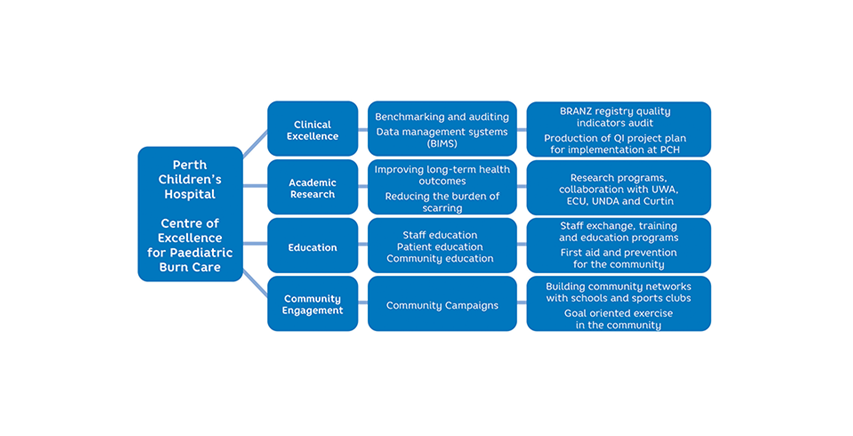Burns Service
Contact
Fiona.wood@health.wa.gov.au
Departmental Overview
The paediatric Burns Service of WA based at PCH is the home of the Stan Perron Centre of Excellence in Childhood Burn Injury supported by the PCHF. The research is based on the understanding that every intervention from the time of injury influences the scar worn for life. As such, activity spans the community, prehospital, links with the basic science of injury and healing, on to the focused interventions and holistic rehabilitation.
Key Research Questions
- What is the mechanism that leads acute burn injury to sustain health problems long after recovery from the burn?
- How can we ameliorate scarring and minimise the impacts of scarring on children as they grow?
- How can we identify the patients ‘at-risk’ and provide personalised interventions to optimise their health journey?
- What is the role of tissue regeneration in reduction of lifelong scarring?
- How can we reduce the pain and stress of burn injury?
Using a range of tools and collaborations the aim is to reduce the scar worn for life physically, functionally and psychologically outlined in the examples below:
Biobanking
Establishing a paediatric burn trauma biobank to obtain biological samples (hair, urine, faecal and blood samples) together with clinical data for up to 500 paediatric patients, and hair samples from their parents, using systems biology approach and other methods to understand the systemic and long-term physiological impact of burn injury on the child, and biological stress for the parent, and how these factors influence life trajectory.
Impact study
Assesses the psychological and emotional impact of burn injury on the patient and their parent across the first 12 months after their burn. This will identify areas of psychosocial need, those who are most at risk, and potential intervention strategies to address these needs. In addition, physical outcomes are assessed to understand the how psychosocial factors impact return to exercise.
Psychological support and coping
A co-design study of a coping strategy training intervention study by collaborating with Professor Helen Milroy’s team at TKI.
Chemistry of trauma and healing
A multi-centre paediatric study to investigate markers of burn severity (to assist with acute clinical decision making) and to understand the impact of burn injury on immune cells. This project is supported by NHMRC funding and involves Queensland and NSW paediatric burn centres.
3D printing in situ for acute surgical intervention
In collaboration with Inventia (Sydney) developing a 3D printer that can be used in the operating theatre to deliver cells and scaffolds to promote healing extending the well-established work in cell based therapies.Long-term impacts of burn injury on the immune system
We have investigated the circulating cytokine (cell-to-cell signals) in paediatric patients following their burn injury and shown increased levels of three pro-inflammatory cytokines was also analysed for antibody levels to the diphtheria, tetanus and pertussis vaccine, and burn patients were found to have lower rates of vaccine-mediated protection.Burn injury and cancer
We are collaborating with researchers in the Cancer Immunotherapy Unit at TKI to investigate the link between burn injury and cancer. We have tested and confirmed that burn injury results in increased incidence of cancer in mouse models and have sown that this increase is immune-mediated via the use of immunogenic tumour models. Our preliminary functional testing in infectious mouse models has identified two key immune cell types that may be dysfunctional after burn injury.

